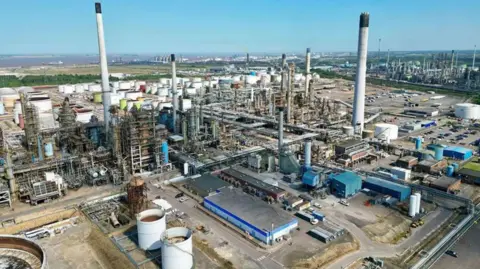The Lindsey Oil Refinery in North East Lincolnshire has ceased production, a development that officials have confirmed is a consequence of its owner, Prax Group, entering administration. This situation has put approximately 420 jobs at risk and has raised concerns about the local economic impact. The refinery, situated near the town of Immingham, was taken over by the Official Receiver in June when the company’s financial struggles became untenable.
The severity of the situation was highlighted by Harriet Eisner, a regional coordinator for Unite, who stated that the refinery ran out of crude oil supplies last Friday. In light of this, Energy Minister Michael Shanks mentioned that “no credible offers” had been made to buy the refinery. As a result, operations began to wind down, further solidifying the grim outlook for the facility and its workforce.
Despite the shut down, the government has indicated that the Official Receiver will continue selling the refinery’s refined products for a few weeks. This strategy is intended to provide some flexibility for potential buyers to adjust their supply chains amidst the changing circumstances. Earlier this week, in a show of support, Council leader Rob Waltham of North Lincolnshire emphasized the need to keep the refinery operational for an extended period to attract potential buyers. He lamented the imminent closure as a “devastating blow” to the community, expressing concern that thousands of jobs were in jeopardy, not only at the refinery itself but also within the supply chain.
Waltham has also called on the government for immediate financial support for businesses in the supply chain, protection for workers’ pensions, and a comprehensive remediation and redevelopment plan for the refinery site. The refinery’s fiscal troubles were not new; it had recorded losses amounting to £75 million over the span of three years prior to its closure. Shanks expressed disappointment regarding the situation, acknowledging the untenable position left by the Prax Group while emphasizing that the government would continue to seek interest from potential buyers for the refinery’s individual assets. With assurances made, he noted that all employees would have job guarantees over the coming months, but the anxiety within the community remains palpable.
In the wake of the announcement, many local residents and stakeholders have conveyed their distress and apprehension regarding the loss of a significant employer in the area. The refinery has acted as an economic linchpin for the locality, and its absence would reverberate throughout North Lincolnshire’s economy. The ramifications extend beyond job losses; they touch upon the well-being of families and the broader community, which relies on the refinery for economic stability.
As the discussion around potential buyer engagement continues, the resultant effects of this industrial closure draw attention to the precarious nature of energy and economic sustainability in the region. Stakeholders remain engaged with local authorities to monitor any developments surrounding the search for a buyer or new intervention strategies to salvage the facility.
For those interested in more on this story, there are multiple related articles highlighted, including the sentiments of refinery workers regarding their impending job losses, calls for government intervention to save the refinery, and the need for support to mitigate the impact on affected workers. As this story unfolds, the focus remains on finding sustainable solutions that balance economic interests with community welfare.












